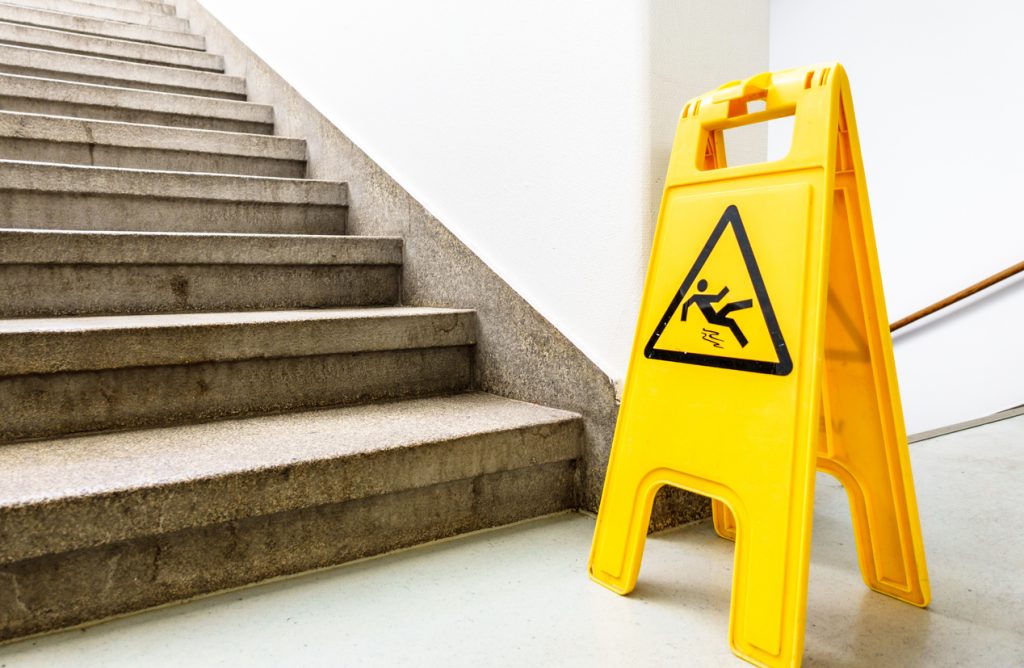Slip and Fall Injuries in the Workplace

A workplace slip and fallis not only embarrassing, but it can lead to very serious injuries. These can include– broken bones, concussions, traumatic brain injury, spinal cord injuries, sprains to the back, wrists, ankles, and many others. Trauma can require a worker to seek emergency medical attention, undergo surgery, and take extensive time off work for rehabilitation.
Worker’s compensation may not cover all your expenses. However, it may be possible to step outside the system and sue for damages if your employer has failed to maintain the premises. For a slip and fall on commercial property, it is best to work with Douglas & London. You will find an experienced slip and fall attorney in New York City who can protect your right to sue and help you pursue maximum compensation.
When to Call New York City Office Building Slip and Fall Lawyers
If you slipped and fell at the office, you may have been told workers’ compensation insurance will take care of it. Although this is the general rule, there are many circumstances where suing for damages with a team of slip and fall lawyersis advantageous to your recovery.
Call our experienced slip and fall attorneys for a free consultation!
Cases where you have grounds to sue your employer may include:
- The employer failed to inspect the property to reasonably identify risks, dangers, or hazards.
- The employer knew of a property defect but failed to take reasonable steps to remedy the situation.
- The employer knew of a hazardous condition but failed to warn patrons and employees of the risk.
- The employer’s failure to train employees on a work-related task directly led to the slip and fall.
It’s free to consult with an NYC slip and fall lawyer, so it’s always worth exploring your legal options.
Common Causes of Slip and Fall Injuries in the Workplace
Slip and fall injuries occur because the business owner has failed to repair defects through routine maintenance. This, in turn, leads to dangerous conditions for the people who work there every day. These defects may include:
- Broken light bulbs – The area can be unreasonably dark if light fixtures are not maintained.
- Dirty floors – Slippery surfaces from spills should be someone’s responsibility to mop and place warning signs.
- Wet floors – Water or snow routinely tracked into entryways should be mitigated with floor mats.
- Waxed floors – Too much polish or wax, or uneven application, can significantly increase a fall risk.
- Carpet damage – Torn, worn, curled, or bulging carpets create a tripping hazard.
- Cracked flooring – Uneven floor surfaces, holes, or cracked tiles can cause employees to trip.
- Broken stairs – Falls arise from debris, worn treads, poor design, broken railings, and crumbling steps.
- Elevators – Danger exists with door malfunctions or failure to stop flush with floors.
- Parking lot damage – Parking lots must be adequately paved, with snow and ice removal as necessary.
- Sidewalk damage – Sidewalks should be well-maintained and even to limit liability for a trip and fall.
Compensation in Slip and Fall Settlements
The national median award for a slip and fall case on commercial property is $345,000. The value of the settlement is typically paid by the employer or landlord’s property insurance policy. For a workplace slip and fall lawsuit, plaintiffs are encouraged to list damages (losses) such as:
- Medical bills include hospital stays, doctor copays, surgeries, ambulance rides, prescriptions, etc.
- Home modifications to accommodate a disability, such as rails, ramps, tubs, stair chairs, etc.
- Lost income – Past and present time off work and diminished future earning capacity can be collected.
- Pain and suffering can be estimated — Add up actual damages and multiply by 1-5x based on severity.
Cases involving gross negligence on the part of the employer can result in much higher slip and fall settlements. Douglas & London obtained $750,000 for a woman who slipped, fell, and fractured her hip at an NYC hospital.
What To Do After a Workplace Slip and Fall
Seek immediate medical attention after a workplace slip and fall, even if you suspect the injuries are not serious. Sometimes pain and movement limitations worsen in the coming days or weeks. However, seeing a doctor early on is the best way to validate that your physical condition is a direct result of your fall at the office. Be sure to speak to a manager or superior to let them know what happened as well. They may need to fill out their own internal paperwork to document the injury. Save evidence like the shoes you were wearing. Take photos of the accident scene. Get the names and contact information of anyone who saw you fall.
Rather than wonder what to do after a workplace slip and fall, your next step should be to contact a local NYC attorney who knows what to do and has the resources to help your case succeed. Even if you’re not sure whether you should sue or not, it’s vital that you understand your legal rights and options for collecting compensation, particularly if the injury worsens or causes significant out-of-pocket expenses.
Injured in a slip and fall accident? Tap to call for a FREE consultation!
Contact Us for a Free Consultation
The clock starts ticking the day you fall, so the sooner you seek advice from a lawyer, the better. You may have as little as six months to initiate a claim or up to two years to file a personal injury lawsuit in NYC, depending on the entity you’re suing. Call Douglas & London today. You owe us nothing until we recover compensation on your behalf.

